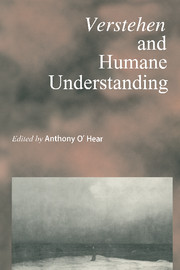Book contents
- Frontmatter
- Contents
- Notes on Contributors
- Preface
- ‘Two Cultures’ Revisited
- Rational and Other Animals
- Vico and Metaphysical Hermeneutics
- Three Major Originators of the Concept of Verstehen: Vico, Herder, and Schleiermacher
- Weber's Ideal Types as Models in the Social Sciences
- Verstehen, Holism and Facism
- Interpretation in History: Collingwood and Historical Understanding
- The Meaning of the Hermeneutic Tradition in Contemporary Philosophy
- Science and Psychology
- To Mental Illness via a Rhyme for the Eye
- Can There be an Epistemology of Moods?
- Feeling and Cognition
- Believing in order to Understand
- Data and Theory in Aesthetics: Philosophical Understanding and Misunderstanding
- Anti-Meaning as Ideology: The Case of Deconstruction
- Perictione in Colophon
- Index of Names
Verstehen, Holism and Facism
Published online by Cambridge University Press: 17 May 2010
- Frontmatter
- Contents
- Notes on Contributors
- Preface
- ‘Two Cultures’ Revisited
- Rational and Other Animals
- Vico and Metaphysical Hermeneutics
- Three Major Originators of the Concept of Verstehen: Vico, Herder, and Schleiermacher
- Weber's Ideal Types as Models in the Social Sciences
- Verstehen, Holism and Facism
- Interpretation in History: Collingwood and Historical Understanding
- The Meaning of the Hermeneutic Tradition in Contemporary Philosophy
- Science and Psychology
- To Mental Illness via a Rhyme for the Eye
- Can There be an Epistemology of Moods?
- Feeling and Cognition
- Believing in order to Understand
- Data and Theory in Aesthetics: Philosophical Understanding and Misunderstanding
- Anti-Meaning as Ideology: The Case of Deconstruction
- Perictione in Colophon
- Index of Names
Summary
A subtitle for this paper might have been ‘The ugly face of Verstehen’, for it asks whether the theory of Verstehen has, to switch metaphors, ‘dirty hands’. By the theory of Verstehen, I mean the constellation of concepts—life, experience, expression, interpretative understanding—which, according to Wilhelm Dilthey, are essential for the study of human affairs, thereby showing that ‘the methodology of the human studies [Geisteswissenschaften] is … different from that of the physical sciences’ (SW 177): for in the latter, these concepts have no similar place. Even critics of Dilthey tend to agree that his heart, if not his head, was in the right place: that Verstehen was designed as an antidote to ‘dehumanizing’ attempts by positivists to reduce the categories used in explaining human behaviour (value, meaning, purpose etc.) to just those equally operative in the physical sciences (cause and effect, stimulus and response, etc.). As Dilthey himself put it, ‘there is no real blood flowing in the veins’ of human beings as examined by the positivists and their precursors: they do not treat of ‘the whole man’ (HS 73). The idea of Verstehen, it seems, is doubly humane: a humanizing approach to the humane studies.
A rather indirect reason for pausing before this favourable verdict is the reputation of an earlier thinker much admired by Dilthey—J. G. Herder.
- Type
- Chapter
- Information
- Verstehen and Humane Understanding , pp. 95 - 108Publisher: Cambridge University PressPrint publication year: 1997



